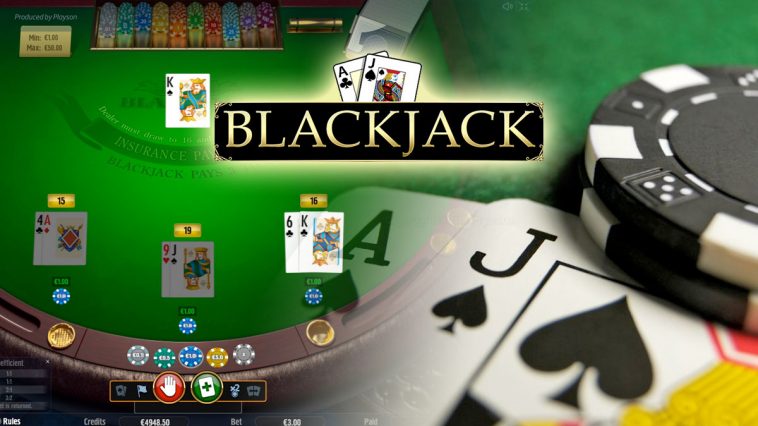I’ve written about countless variations of blackjack, but perhaps the easiest one to understand is multiple action blackjack, also referred to as multi-action blackjack.
In fact, this variation is so straightforward that this post might be a little shorter than usual.
Here’s what you need to know about multiple action blackjack.
The Rules of Multiple Action Blackjack
The rules for multiple action blackjack are the same as the rules for standard blackjack.
The difference is that in multiple action blackjack, you get to play three rounds of blackjack with a single hand. And the dealer has the same up-card for all three rounds, too.
When you sit down at a multi-action blackjack table, you’ll see that you have numbered betting spots on the table. These spots are numbered one, two, and three. Each of these is for a separate round.
You still only get a two-card hand, but the dealer only receives a face-up card. They don’t get a two-card hand.
You play your hand just like you would in a regular blackjack game. You can hit, stand, double down, split, and take insurance—all just like you would in a standard blackjack game.
If you bust your hand, you lose your bet right then.
But once you and the other players have made all your decisions, the dealer plays the first round. Their first action is to take their second card, the one that they would typically have “in the hole.”
Then they follow the house rules for playing out the hand, usually standing on a soft 17 and hitting any total of 16 or less.
Once the dealer completes their hand, they pay out bets to winners and collect bets from losers for the first round only.
The dealer then discards all the cards except for the first face-up card and plays the second round the same way. After that action is resolved, the dealer plays out the third round.
How the Bets Are Resolved and Examples of Play
I’m assuming you have three bets on the table. You should understand that each bet is resolved during a separate round of play.
Suppose you get dealt a 15, and the dealer has an up-card of nine.
You hit, and the dealer gives you a five, so you have a total of 20.
The dealer then plays their first hand. They draw a jack, so they have a total of 19. You win the bet for that round.
On the next round, the dealer plays their first hand, and draws an ace. Now, they have a total of 20, which means your bet is a push. You don’t lose any money on that round, but you don’t win any, either.
On the final round, they play their hand and draw a two, giving them a total of 11. On the next card, they get a 10, giving them a total of 21. You lose your third round bet.
How Does This Affect Basic Strategy?
You’ve probably read this a million times, but I’m going to repeat it again here:
Always play according to basic strategy.
In multiple action blackjack, you’re just playing 3 separate hands. What happens on those hands happens after you’ve made all your decisions, so counting cards doesn’t have much of an effect on your basic blackjack strategy decisions.
And basic strategy is the mathematically correct way to play every possible hand versus every possible up-card in the game.
If you believe in hunches, you’re reading the wrong blog. You might as well skip basic strategy altogether if you’re going to deviate from it just because you have a burst of intuition.
A lot of players deviate from basic strategy in multiple action blackjack, though.
Here’s why.
Since they have three bets on the table, they know that if they bust, they’re going to lose all three bets immediately. So, instead of making the mathematically correct decision, they’ll often stand on stiff hands when they should hit them instead.
They might even come out ahead a few times in this situation, providing them with some confirmation bias to encourage that kind of decision moving forward.
If you’re not willing to play each hand according to basic strategy because you’re too nervous about losing three bets at once, you should just play standard blackjack instead.
Or you might consider that you don’t have a big enough bankroll to be gambling in the first place. That’s a common occurrence among players who are too afraid of losing to make mathematically optimal decisions.
Since you’re playing two or three hands at a time at a multiple action blackjack table (you get to choose), you’re going to see more significant swings than usual. Be ready for that and have a bigger bankroll to compensate.
The History of Multiple Action Blackjack
The Four Queens Casino in Las Vegas invented and popularized the concept of Multiple Action Black. As of 1992, it cost $500 per month per table to license the game for your casino. That sounds like a lot of money, but if you compare it to how much the expected win for the casino is for this game, you’ll realize it’s not expensive at all.
Multi-action blackjack exploded in popularity in the 1990s. Not only was it available in dozens of casinos in Las Vegas, but it also became popular at Indian casinos throughout the United States, too.
Why was it so popular with the casinos?
Well, the casinos win more money at the game by a significant margin. Even at a table where the minimum bet is $2, the minimum you had to risk per hand was $4.
If the house edge is the same, how did the casinos make so much more money from the game?
Remember my advice about sticking with basic strategy?
Most gamblers don’t do that at the multiple action tables.
And when gamblers deviate from basic strategy, the casino benefits from it every time.
If you don’t think deviating from basic strategy is a big deal, think about this statistic:
Multiple action blackjack tables make 50% more money on the same amount of action, on average.
Is Multiple Action Blackjack a Good Idea for Card Counters?
Card counters wondering whether multiple action blackjack is a good idea should rest assured that this might be one of the best games to count in.
For one thing, you’ll see two to three times as many cards on every hand, which means you’ll have more information about the composition of the deck.
For another, one of the ways casinos spot card counters is by noticing when they deviate from basic strategy. Since deviating from basic strategy is common at multiple action blackjack tables, this provides a level of camouflage for the counter.
And casinos might be less concerned about card counters getting a tiny edge because the other players at the table are contributing so much more to the casino’s hold numbers already.
If you’re just a basic strategy player, multiple action blackjack doesn’t offer you any real advantages. It just forces you to put more money into action on each hand. And it encourages you to deviate from basic strategy.
If you’re a counter, though, and you can find a multi-action blackjack table, you should take it for a spin and see what you think.
Can You Still Play Multiple Action Blackjack?
Despite the game’s popularity in the 1990s, it’s hard to find these days. I read a post in a forum about the subject that claimed that the game was extinct in Las Vegas and could only be found at one casino in Atlantic City.
And that discussion thread was dated 2008.
Conclusion
You might be asking why I would write a blog post about a game that’s hardly played anymore.
The answer is simple.
Discussing this game is a great way to illustrate some general points about gambling that most casino gamblers should think about but don’t.
The main point is that you should stick with the most mathematically sound strategy as much as you can, even when it seems counterintuitive.
If a casino makes that much extra money from a game just because players get scared and make bad decisions, imagine the long-term effect that ignoring basic strategy will have on an individual’s bankroll.
Michael Stevens
Michael Stevens has been researching and writing topics involving the gambling industry for well over a decade now and is considered an expert on all things casino and sports betting. Michael has been writing for GamblingSites.org since early 2016. …





